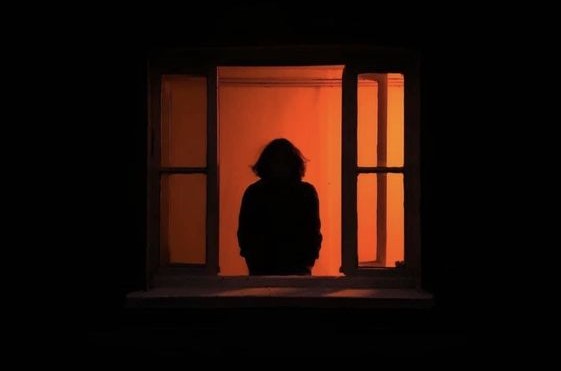I woke from a deep sleep and lay on my back for a good minute, looking through the window at the autumn sky, which was clear after a week of rain. Then suddenly I had this strange feeling. You were lying next to me, very still. For a second I panicked. Then I remembered how ill you’d been. A virus, maybe even influenza. You’d been feeling terribly weak. Your limbs had ached and you’d spent most of the weekend in bed with a fever. Now it was Monday and you were meant to be at work, but I thought I’d let you sleep. I reached across to the night table for my phone and looked at the news. There was a story about underpaid migrant labour. The story had a photo of a man (or woman?) in a balaclava, packing meat in a supermarket. This country, I thought, what was it coming to?
Down in the kitchen I filled the electric kettle but couldn’t get it to boil. The little orange light on the handle seemed dead. No sizzle either. I switched to another socket, turned it off and on, still nothing. I had to tip the water into a saucepan and boil it over the gas, old-fashioned style. Something was wrong. I’d find out later. Meanwhile, on my earphones I was listening to The Wind-Up Bird Chronicle. I was near the end. I’d been listening for a week. I’d reached the part where Mr Windup Bird’s cat, Mackerel, which had gone missing at the beginning of the story, returned after a year. That reminded me of our cat, Gravy. He’d been dying for the past week, ever since I’d started listening to the book. Actually, if the truth be told, he’d been dying for the past year. He was very old, twenty-one years old, which is ancient for a cat. You’d looked up on the web that cats lived to be fifteen. So this one was like one of those ancient Japanese men left over from World War II, one hundred and ten at least, and still collecting his war pension. Only yesterday he’d really seemed to be on his last legs. He’d crawled through a little opening into our garden shed and stopped in a posture that was new, a posture that must have been programmed in him as the final one to adopt in his life. Earlier, he’d kept trying to lie in the wet leaves in the garden, but I couldn’t stand to see him being rained on, so I kept carrying him back into the shed. Just like the cat, Mackerel, he’d become ours soon after we were married.
Now he was dead. At least he seemed dead. I opened the shed door and saw him stretched on the concrete floor. His mouth hung slightly open. For a moment I made a shadow fall by moving under the fluorescent light, and it gave the illusion that he was stirring. But I waited again and there was nothing.
So I shut the shed door. But before I got back to the kitchen I thought, Don’t be ridiculous, go and put your hand on him so that you can be certain. As soon as I touched his fur it felt different. It was the same inert feel, the coldness and slipperiness of a fur coat. It was like the muskrat coat you’d inherited from your mother. Our cat’s fur felt exactly the same to the touch and his body was stiff with rigor mortis. Well, it’s certain, I thought. I’d bury him later, when I came home from work. The weather wasn’t hot.
I phoned to cancel the car service I’d booked for the morning. I didn’t want to take the car and have you wake, decide to start work late and then be without transport.
When I got to the office there was no sign of Luke. He’d been on sick leave. For him every autumn was the same. He’d be off with bouts of bronchitis. There was a message from Colleen about problems upstairs that was probably the rain too. I walked to her office. Colleen was stressing. This was Luke’s business, not really mine, and so I was expecting if I turned up in person and offered to help I’d have the satisfaction of surprising her and cheering her up. But in fact it seemed to have no effect. There was no emotional bonus. I was disappointed. If I was ten years younger like Luke, I thought, this would have cheered you up, wouldn’t it?
Upstairs, the network was out in one room. While I was phoning the technicians, Jenny came by and dragged me to her office. A large dead rat lay in a corner. It had probably been savaged by the feral cats that lived around campus and that kind-hearted people kept feeding in spite of what the administration warned us not to do. It was as stiff as our cat. I made some casual remark about having to bury another corpse when I got home.
“Oh, you poor thing.” Jenny could be sentimental. But in the same breath she insisted, “I can’t bear it,” pointing at the rat, “can’t we get rid of it?” I plucked it up by its tail and Jenny screamed, “Don’t touch it!”
So I put my hand inside a plastic bag and inverted it over the corpse and carried it out as if I’d been shopping for dead rats. Jenny immediately went back to browsing her own web profile, oblivious to me. Finally I got to my office as the phone was ringing and I could see it was Muriel from the building next door. Muriel was another woman about my age, about the same age as Colleen and Jenny, and I thought to myself, No, I don’t need to be ignored again, and went for coffee.
As I walked towards the café I heard two students talking loudly behind me, at least the male student was loud. “Emily is trying to be, you know…,” he was explaining to the female who obviously knew Emily too. And then he added, “We were having sex and she reached out and pulled this thing over her head.” That was strange. I wondered whether we’d talked like that when we were students. The memory came back to me of Joe’s friend, Smeg, telling a bunch of us once how he’d been walking along the shoreline of Mrs Macquarie’s Point with his girlfriend and they’d decided to have sex in a cave opposite the opera house, and when his girlfriend started coming she threw her head back—she was on top of him—and banged it on the rock ceiling of the cave so hard she passed out and he had to take her to hospital. We’d all found that amusing. But Smeg had only told that story to the guys. I couldn’t imagine him telling a female friend that in casual conversation while they walked up the street. So things must have changed since I was a student.
At the coffee kiosk I got a look at them. The male was small and scruffy and ordinary, though his ginger hair was in dreadlocks, and the girl was almost as scruffy looking and incredibly thin with skin-tight jeans. Just undergraduates. Just friends. I noticed the headline on the newspapers sitting on the stand—exploited immigrant labour.
After work I met Lance in the café. I avoided mentioning the dead cat because Lance was in mourning. His mother had died last year. But maybe that was stupid of me. Instead we talked about Julian Assange, who was trapped in the Ecuadorian Embassy in London. Lance told me so many police were staking out the embassy that people shopping at Harrods, which was directly opposite, could park their bicycles and not even bother locking them.
Harrods reminded me, and on my way home I stopped at the shopping mall in Broadway to buy a shoulder of lamb. I had to kneel on the supermarket floor and rifle through a heap of them sealed in plastic wrap, like body parts—well, no, not “like”, they were body parts—until I found one my size, two kilos. It was only when I was leaving that I remembered the news item about underpaid migrant labour. Fuck, I thought. But, then, I didn’t take the shoulder back and demand my money be sent to exploited meat workers.
When I turned into our street I noticed the car parked outside, which meant you must have been too sick to get to work. I left you in peace. I put off grave digging and started roasting the lamb. Once I’d got the shoulder out of its plastic wrapper I dried the semi-coagulated blood with paper towels on the marble bench top. I sharpened the carving knife and carved off some of the surface fat, which was stamped with the same old-fashioned red dye they’d been using since I was a small child and my mother would take me to the butcher to see whole carcasses hanging behind the counter.
And then I thought of Boris, the man Skinner, in The Wind-Up Bird Chronicle and how, while I was listening, I’d actually had to pause several times, the description of the Japanese officer being flayed alive was so harrowing.
Once the lamb was baking I had no more excuses. I dressed in old clothes, undertaker’s clothes, or perhaps more correctly, sexton’s clothes, put on surgical gloves and went into the garden. You and I had discussed our cat’s grave location at the beginning of the week. I’d had this bright idea that we bury him underneath one of the stepping-stones. Then we wouldn’t be in danger of unearthing him when we were gardening. Though, God knows, we never found any trace of the other pets we buried over the years. They must return to the earth pretty rapidly. You’d been attracted to the idea of burying him in the corner closest to the neighbour’s back door because that’s where you were going to plant the passion fruit. Years ago, you’d read that the best way to get a crop of passion fruit was to plant the new vine on top of a dead sheep. A dead cat might do almost as well, you thought. But then you decided it might stink, and having it directly outside the neighbour’s back door might be embarrassing. So we decided to bury it under the stone closest to the lawn. We’d gone through all this while our cat was still alive, hobbling around the house during his final days, letting out strange agonised noises that reminded me of the call of the wind-up bird in the Japanese novel. Our wind-up cat.
I fetched the wheelbarrow, the spade, some of the bright plastic garden waste buckets you’d bought and the little trowel. I started digging. Above me one of the teddy bear bees was buzzing on its final days of foraging before winter sent it into hibernation, or finished it off. Mozzies bit the little bits of exposed skin between the surgical gloves and my shirt cuff. I shovelled the sand bedding immediately beneath the stepping-stone into one bucket. Then I dug into the garden mix and was surprised to unearth incredibly fat worms. I thought of Hamlet: Your worm is your only emperor for diet. But not garden worms, surely, Mr Hamlet, some other kind of worm. I wondered if they’d been swollen by the rain. But that didn’t really make sense. Then I got to the clay. I had to get your geology pick.
What made it particularly difficult was that I was trying to avoid stomping on your annuals. So I had to rest on one leg like an ancient miner in a low shaft. I dug as much clay as I could bear. I stopped digging and came in to turn the lamb in the roasting pan. Dark red viscous strings of something I didn’t quite know what stretched from the meat to the metal when I lifted it on the fork. I’d never seen anything like that. What could they be? They were like toffee. But there’s no sugar in roasting meat, surely. Some sort of protein maybe?
I returned to the shed, gritting my teeth to retrieve the corpse. Would ants have colonised it? Would there be maggots? Once, I’d lifted a long expired pigeon to uncover a hundred furious white maggots on its underside. That had taken my breath away. I took hold of one of the cat’s forelegs. He was still stiff but not as stiff as this morning, the rigor was wearing off. He was so waisted that even as deadweight he didn’t feel heavy. I carried him by the one foreleg, like a furry tennis racquet, and I realised as I reached the hole that he was way too long. I dropped him on the lawn and dug some more. Sweat was pouring out of me by this stage. Our other cat came to inspect. I wondered what she would make of her companion’s corpse. Should I have kept her away, hidden her dead companion inside a sack so that she didn’t see? But that seemed ridiculous. What would be the point? Saving her from trauma? But domestic animals don’t get traumatised by seeing dead domestic animals. Surely that’s natural. I was overcomplicating it.
Widening the hole wasn’t difficult. I was able to collapse the dirt into the portion I’d already dug. Finally I draped him in. I was thinking, Which part is going to cause the most smell, the head or the hindquarters? I couldn’t decide. He was very emaciated. His mouth hung open macabrely. But his fur was still even and well groomed. I emptied the bucket of clods and they covered him, all except for his head. Then I reached for the large bucket of garden mix and struggled to lift it across the bed without overbalancing, only when I glanced down at the grave, I saw the cat stir and begin to struggle as if it was attempting to climb out and return to life. I thought, No, this isn’t possible, this must be an illusion. Terror started in me and I began panting, repeating that it must be my imagination, it wasn’t possible, until finally I let the soil drop into the pit and he was gone. I stood, gasping, still barely keeping down my anxiety until I was satisfied the grave was quiet and the cat had really gone. Of course the cat had gone. What was I doing imagining such things?
I heaped up earth as a burial mound. I dropped the stepping-stone, squashing the mound down. I waited. Was I expecting the dead animal to force its way back to the surface? Ridiculous. In bed that morning I considered inscribing the stone. But what would I write?
I thought I heard our son arriving home. I hadn’t told him about the cat this morning. I’d remembered how he and I had made an elaborate ceremony of burying the pet guinea pigs when he was eight or nine years old, in a shoebox with little items they’d need in the afterlife, food pellets, sprigs of fresh grass, a blanket. I thought for some illogical reason that even though he’s now twenty and, far from being innocent anymore, in his undergraduate neural anatomy tutorial he’s actually seen a human head being sliced down the middle, that somehow he would be upset by the sight of a dead cat. But I’d misheard. He hadn’t come home.
It was almost dark. I stood by the grave, sweating, and I thought of the Chinese prisoners of war who’d been made to dig their own grave in The Wind-Up Bird Chronicle. The prisoners had been bayoneted due to a shortage of ammunition, except for one who’d been beaten to death with a baseball bat. It was horrific. The digging of their mass grave itself had been described briefly as if it was something entirely mechanical. And yet now I was so exhausted and sweat-soaked just from digging a small hole to bury a cat—I felt slightly nauseous—that it seemed as if I’d been made to dig a hole for my own body, two metres deep, and had actually struggled to the end of it. I would have been so exhausted, death might have seemed a comfort.
I walked upstairs unsteadily, stripped off my soaking clothes and showered. Finally I came into the bedroom to let you know the job was done. During the cat’s last days you’d become sentimental. The truth was that the cat was a mean old brute. He turned up on our doorstep as a juvenile and we’d felt sorry for him. But clearly he hadn’t been handled enough by humans when he was a kitten and so he was never fully domesticated. He bit and scratched. He killed rats regularly, although he didn’t need to to feed himself. He was half wild. You’d been waiting out his allotted lifespan so we’d be rid of him. But when he staggered around at the end, every now and then letting out a howl of incomprehension about what was happening to him, you’d had tears well up in your eyes. “Why am I so sentimental?” you’d asked. Because you’re getting sick, I’d told you. So now I thought maybe I could suggest we get a replacement cat, another sweet little female that we could dote over.
But when I came into the bedroom you were lying still and it seemed as though you hadn’t moved since the morning. I watched for a moment and then, suddenly, rushed to the bed. Your body was as cold as the animal’s. All at once I was weeping hysterically, uncontrollably.





